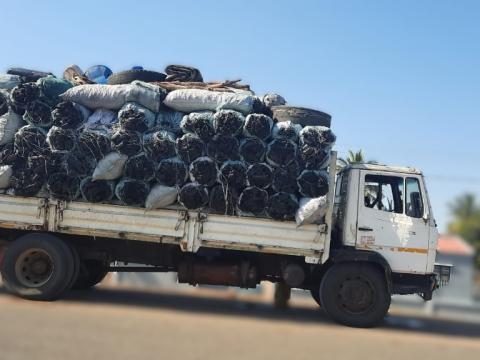Regreening Mozambique: Restoring Hope, One Tree at a Time

By: Álvaro Malamba, Communications and Advocacy Coordinator
In Covela, Mabalane, southern Mozambique, life used to be different. About three decades ago, the land was rich with trees, shade was plentiful, and the soil so fertile that a seed dropped by chance would sprout. Back then, the Limpopo River flowed freely throughout the year, nourishing fields and lives.
Presently, that landscape has changed. Not just because time has passed, but because the land has been pushed beyond its limits. Human pressure has forced nature into retreat. What was once abundant is now scarce. Granaries once full now stand empty. The river that used to flow year-round now dries up for months at a time.
For decades, charcoal production has been a lifeline for thousands of families in Mozambique’s rural communities. With limited income opportunities and no access to formal employment, many have turned to cutting down trees to produce charcoal, simply to survive another day. But this daily act of survival carries a silent, long-term cost, one that threatens everyone, as community leader Alberto explains.
“This land was once covered in lush vegetation, but now everything has changed. It’s no longer fertile. The lowland fields have become a secondary means of survival,” said Alberto, his gaze heavy with sorrow.
The Environmental Toll of Charcoal
In the northern region of Gaza province, particularly in Mabalane, charcoal is extracted from native trees and transported in large volumes. Along the main road that links northern and southern Gaza, it is common to see at least ten two-axle trucks daily, each carrying 90 to 100 bags of charcoal. Each bag weighs between 50 and 60 kilograms, meaning a single truck transports between 2.5 and 3.5 tonnes.
According to local producers, one 50–60 kg bag requires roughly 0.25 cubic metres of wood, the equivalent of a full young tree or part of a mature one. A single truckload of 100 bags translates to 25 cubic metres of wood. At ten trucks per day, that amounts to 250 m³, or approximately 1,000 trees down everyday.
This totals 7,500 m³ per month, or around 30,000 trees. Over a year: 91,250 m³. In three decades: more than 2.7 million cubic metres of wood, the equivalent of over 10.9 million trees lost.
But the impact goes far beyond trees. Lush forests become barren plains, the soil is stripped of nutrients, crop yields fall, erosion accelerates, and temperatures rise. Wildlife disappears. Harvests fail. Families go hungry. Classrooms grow emptier as children lose focus under the scorching sun and the burden of daily survival.
“We don’t know what we’ll tell our children in the future. They are the ones who will live with the damage we’re doing now,” lamented Latifa, a mother cradling her newborn child.
Unless sustainable alternatives are found, what may seem like a practical solution today could become an irreversible ecological crisis tomorrow. Because every bag of charcoal tells a deeper story, one of survival, environmental loss, and a planet out of balance.
The Regreening Response
The Regreening Community initiative, led by World Vision, is a beacon of hope in this unfolding crisis. By promoting Farmer-Managed Natural Regeneration (FMNR) and helping communities restore degraded ecosystems, the project empowers rural families to regrow native trees, improve soil quality, and reduce pressure on forests.
Through simple yet powerful practices, such as protecting and nurturing the shoots of indigenous trees, farmers can bring degraded landscapes back to life, enhance food security, and diversify their sources of income. Where once there was dust and despair, life is beginning to bloom again.
“We’re not saying communities shouldn’t use natural resources, but it must be done responsibly, with future generations in mind,” says Mclarence Mandaza, Technical Lead for Environmental Sustainability and Climate Action at World Vision Southern Africa.
“Instead of cutting down entire trees, they can prune branches and allow the trees to regrow. This way, nature can regenerate, and sustainability becomes possible” added Mclarence.
With these actions World Vision is expecting to contribute for child well-being ensuring that land continues to provide necessary ecological system that will among others enable the provision of nutrients to among others end malnutrition, generating even long-lasting income-generating activities for the families that rely on land for survival.